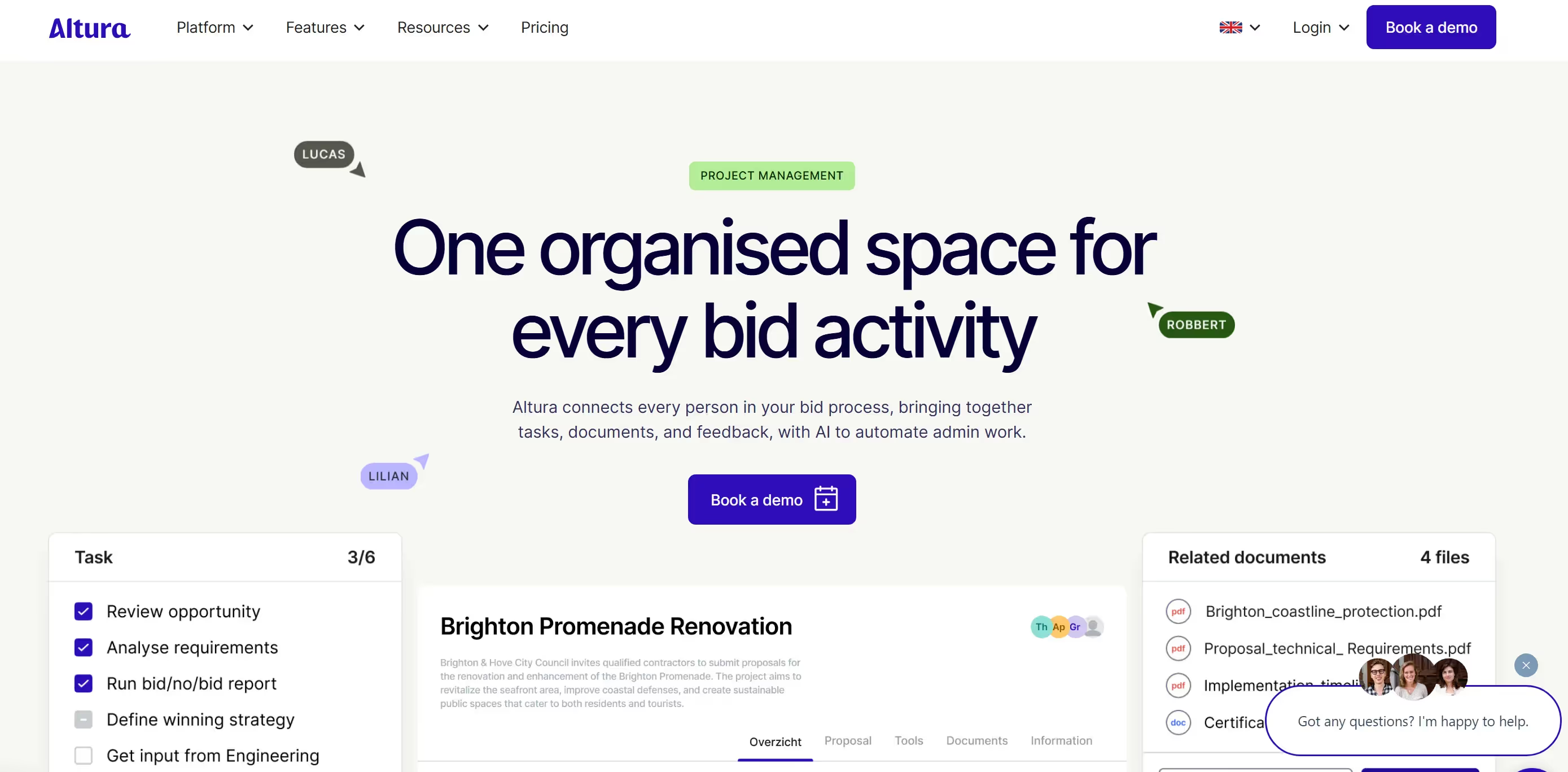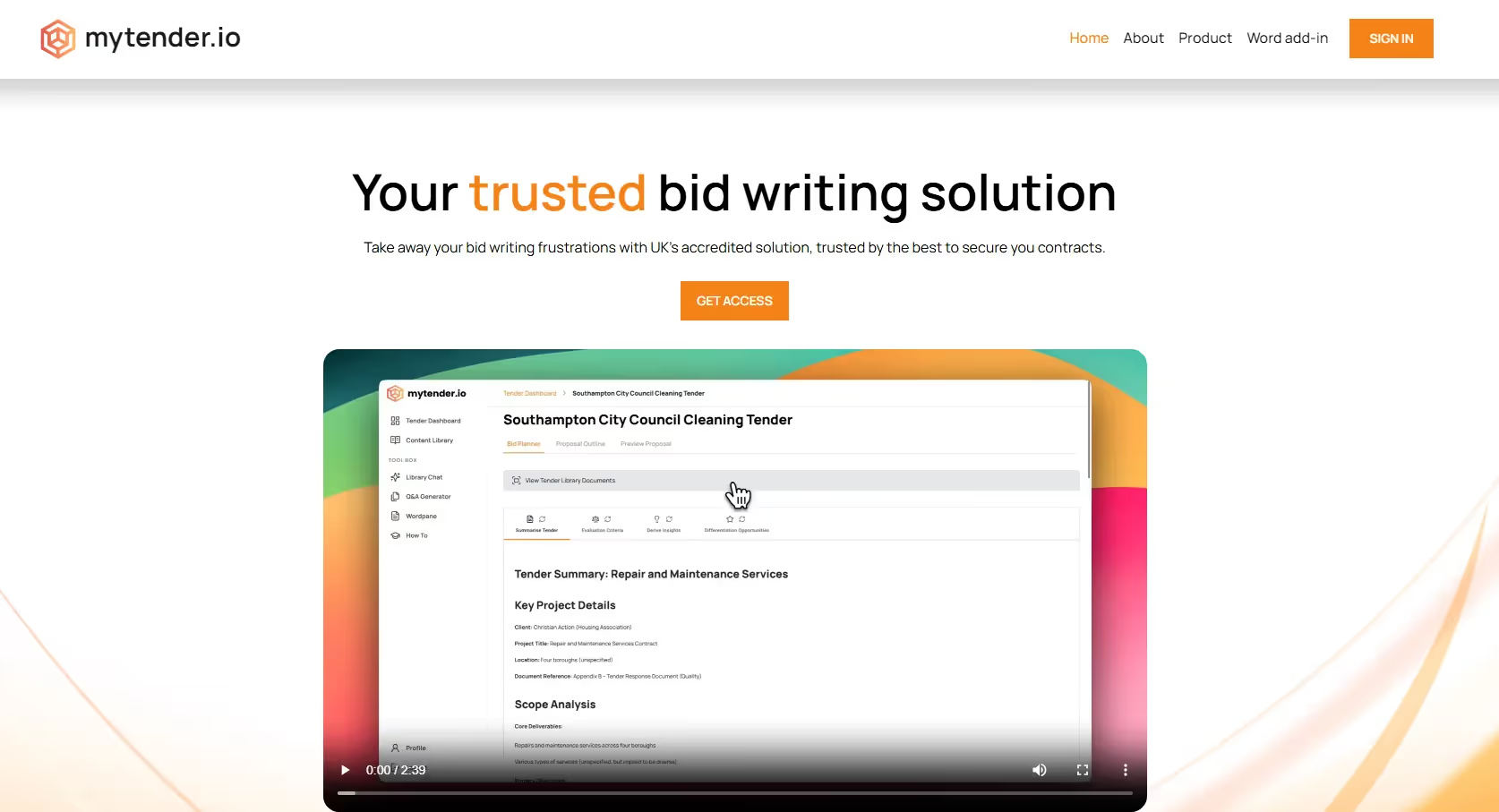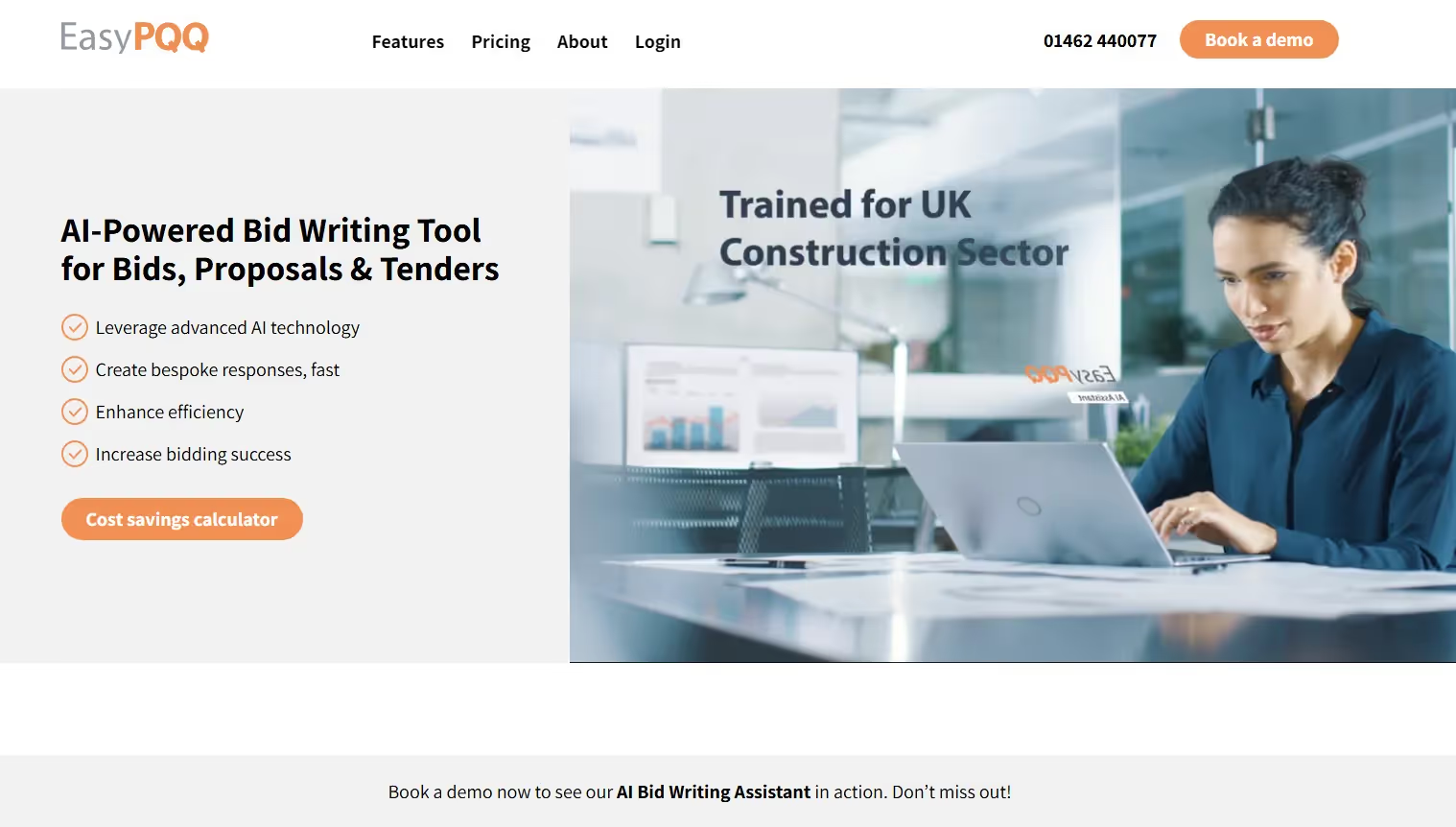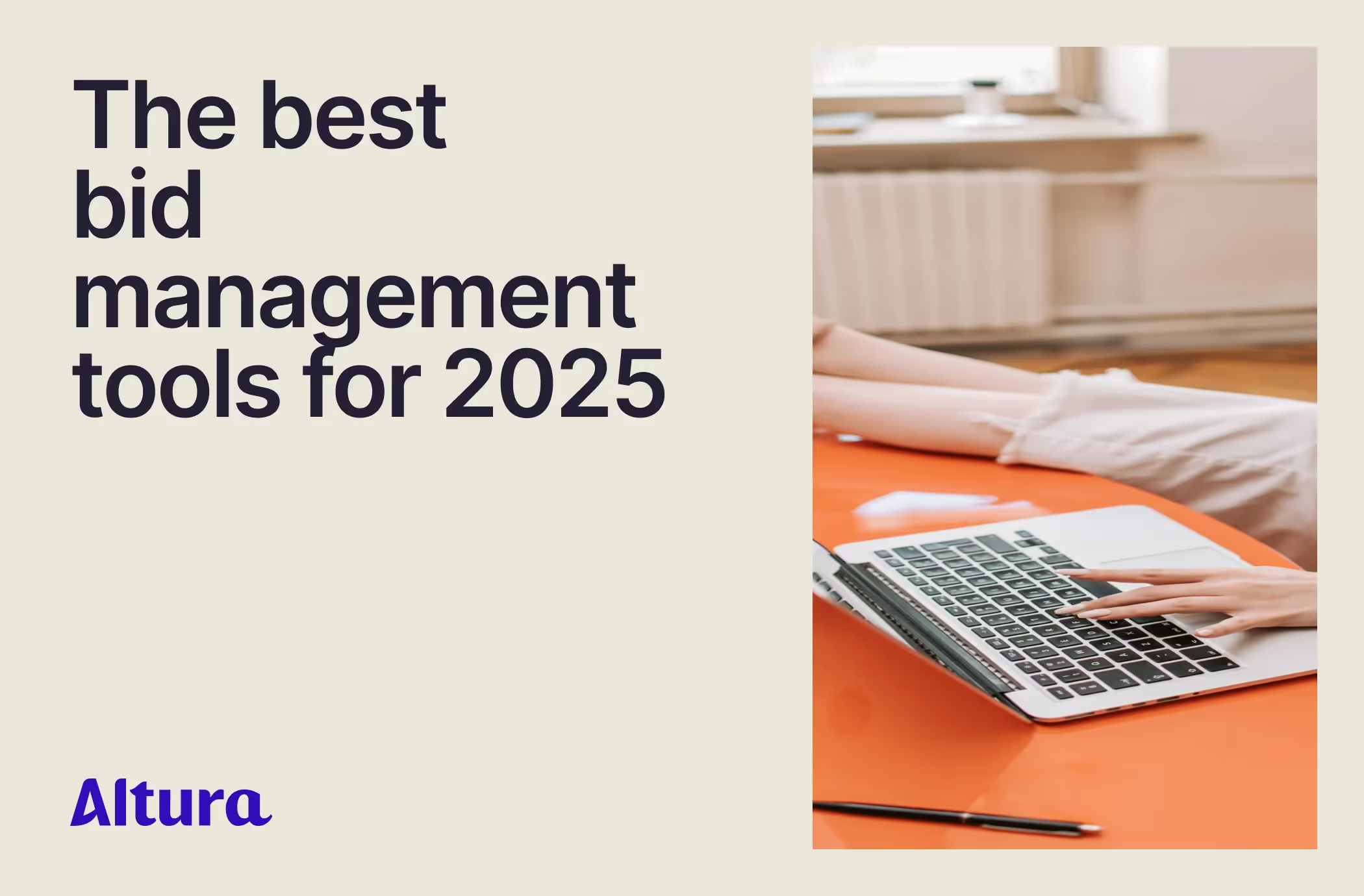3 out of 4 bid management teams are unhappy with their win rate. If you’ve landed here, chances are you’re one of them. Are you currently weighing the options for software that could improve your bid management process? Then you’re in the right place.
In this article, we’ll explore the software solutions that can drive your win rate with the help of AI and data management. Before diving into the list of providers, we’ll first discuss how to choose the right solution for your bid management needs.
Why effective bid management matters
What does losing a bid cost your organisation?
Wouter van Tienhoven (formerly of Yacht, Facilicom, Deloitte, and Randstad), expert bid manager and chairman of APMP Netherlands, estimates that preparing a single bid can take around 300 hours and cost approximately €30,000. This varies for RFPs between €10,000 and €30,000, depending on the size and scope.
Bidding for tenders is often done based on “gut feeling.” But intuition alone is not a reliable guide. Beyond the financial cost, there are other painful consequences of poorly managed bids:
- Wasted time that could have been spent on a more promising submission.
- Negative perception of your organisation among potential clients.
- A demotivated tender team after repeated failures.
Smart bid management isn’t just about working harder
The Bid/No-Bid decision
A critical Bid/No-Bid process helps ensure your efforts are focused on the right tender. While there are different methods for making this decision, the goal remains the same: selecting tenders that align with your organisation’s strengths and offer clear advantages.
By focusing only on tenders with a high win probability, you reduce the number of bids but spend more time crafting high-quality submissions where the effort is worthwhile.
How to apply AI for automisation
During a panel discussion on AI in bid management, Martijn Schouten highlighted how the primary benefit of applying AI is the time it gives back to bid teams.
tasks AI is already taking over
- Detecting expected and new tenders
- Planning submissions aligned with project timelines, including pre-set tasks
- Summarising tender documents
- Performing keyword searches across all tender documents
- Finding quality criteria text from previous tenders
- Generating insights from submission data, market data, and historical tenders
AI saves hours on research, analysis, and tracking. That’s why investing in bid management software is essential - it allows you to achieve much more in less time.
What to consider when choosing the right bid management software
Making the right choice requires knowing what features to expect from bid management software. Below are the key features to look for in today’s tools.
The best features of bid management software:
AI integration
AI automates tasks. Choose software with advanced AI capabilities and ask about both current features and future development plans.
Everything in one place
The best bid management happens in one centralised platform. The more your team can do within the same environment, the less time is wasted switching between tools. Ensure the software supports all stages of your process.
CRM and application integration
If your organisation uses additional systems, the software should offer integration options. Many providers customise integrations upon request.
Inclusive of SMEs, legal, and finance
Top-tier software offers tailored environments for bid managers, writers, tax specialists, legal advisors, and SMEs. This enables all contributors to work collaboratively within a single platform.
Tender management = data
Award decisions, sales conversations, RFIs, and desk research all generate valuable data. The more ways a tender management tool can use this data, the better it will enhance your performance.
Clear communication with your organisation
Compelling internal communication is made easier with clear, automated reports. The software should generate these with a single click, ensuring fast and effective communication across teams.
The 5 best bid management tools of 2025
Here’s our list of the top 5 bid management tools of 2025:
1. Altura

The features of Altura are the most advanced in its class. AI automatically generates summaries of tenders, searches underlying documents for your search terms, and assesses risks based on your inputs.
For project management, you get an accurate overview of the status of tenders and RFPs, while automating manual tasks such as creating schedules.
It also includes an automated tender database that updates four times daily, so you’ll never be 1 or 2 days late again.
By forecasting expected tenders up to 3 years in advance, the software enables you to start influencing early. You can also view weaknesses, key quality criteria, and current competitors’ contracts of to improve your positioning.
Altura supports influencing of expected tenders, spotting newly released tenders, managing projects around submissions, and performing analysis to learn from past tenders and create better bids.
It is the only software that combines these capabilities with your previous bid data for tenders. Altura uses AI to process this data into performance reports for strategy development.
It can also be used for RFPs and private tenders.
Website
Price (annually)
Personalised.
2. Xait

Proposal and bid software designed for co-authoring and collaboration, streamlining the creation and management of bids. It automates common tasks, reducing manual effort, while also allowing users to log and search previous proposals for reference and consistency.
Website
Price (annually)
Customised pricing. Demo available on request.
Bidtracer

Bidtracer enables users to store bids within the system while assigning contributors in a secure workspace, ensuring controlled access and collaboration throughout the bidding process.
Website
Price (annually)
Available on request.
4. Mytender.io

mytender.io is a user-friendly bid writing platform designed to simplify the tendering process. Developed in collaboration with bid consultants, it combines AI-driven assistance with direct expert support. Focused on efficiency and accessibility, mytender.io aims to help businesses create effective bids with less complexity and frustration.
Website
Price (annually)
Available on request.
5. EasyPQQ

EasyPQQ is a bid writing and management tool used across industries such as construction, utilities, and consulting. It automates proposal creation, centralises bid content, and applies AI-driven features to streamline the tendering process. Designed to enhance organisation and efficiency, it supports teams in managing bid documentation and responses.
Website
Price (monthly)
Several packages, monthly subscription
Which bid management tool best suits your company?
Once you start participating in tenders and RFPs, bid management software becomes valuable. With more data, it’s easier to create clear analyses. A larger team also saves more through the efficiencies that software brings. However, it's important for a small team to start processing data in bid management software as well.
But what value does bid management software offer your organisation?
Occasionally (0-10 bids/year)
Software helps you identify tenders earlier than you would yourself on these platforms. These identified tenders arrive in your workspace, where you can convert them into projects.
You can assess each opportunity with a bid/no-bid decision, using standard templates within the software that you simply tailor to your organisation.
In the project workspace, everything contributors need is available. With everyone added to the project, collaboration becomes easier, and the right information is always at hand.
Regularly (10-25 bids/year)
If you manage more bids, you probably use different software for tender identification, document management, project management, data analysis, and evaluation. Bid management software combines these into a single project management environment.
By integrating all processes and combining their data, the software enhances your analysis. This data has valuable use cases and can help you:
- Identify where your content needs improvement
- Evaluate the market and potential opportunities
- Highlight competitors
- Estimate your chances of success
- Invest strategically in product development
The software also presents the data in dashboards and communicates it through clear reports—functions that usually take significant time and are sometimes outsourced. As a knowledge hub, you can support your organisation with strategic insights, even beyond bid management.
Frequently (25+ bids/year)
More bids mean more data. The benefits for regular bidders grow with the increase in submissions, making it even more crucial for frequent bidders to invest in bid management software.
To stay ahead or become the best, you need to invest efficiently, winning as many bids as possible with limited resources. Bid management tools make this possible.
Here’s how bid management software supports you:
- With qualification evaluation, you can ensure your team focuses on the right tenders.
- Post-bid evaluations and tender reviews highlight where to focus your development.
- By automating time-consuming tasks, your team has more time to craft compelling responses.
- With clear dashboards and reports, bid management becomes the knowledge base for leadership and the organisation.
Step-by-step guide: how to choose the right bid management software
To help you choose the right bid management software, we’ve created a step-by-step guide for a well-informed decision:
1. Identify your organisation’s needs
What tasks do you want to automate? Which colleagues will you involve? What data do you need to access? Should it integrate with other applications? These are examples of needs to consider.
2. Research
Gather all available options. Compare them based on your identified needs and create a list of the most promising software solutions.
3. Demos
Contact software providers. Ensure a small group of decision-makers gains a clear understanding of how each solution works in practice.
4. Shortlist
After speaking with potential providers, you’ll have a clearer preference. Create a shortlist of the best options.
5. Choose with a small group
Make the final decision with the core group involved. This ensures swift action based on informed input, avoiding delays from too many opinions.
Get started with bid management software today
Now you know what your organisation needs, what to expect from available solutions, and how to structure your decision-making process. The next step is to evaluate your options.
We can help with that. Altura leads the way in bid management software, offering automation, data insights, AI tools, and project management.
It provides data management tools and unifies your bid management in a single environment. Would you like to learn more?









.png)


.avif)




